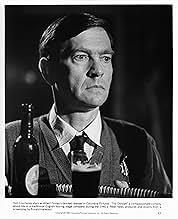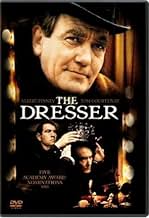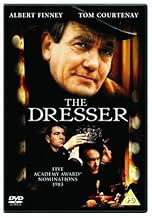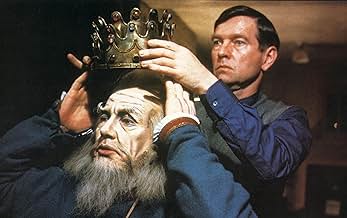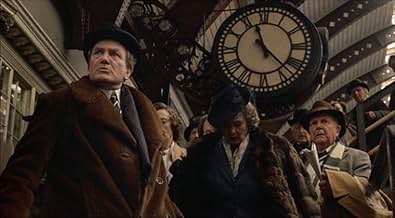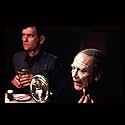IMDb RATING
7.5/10
6K
YOUR RATING
Personal assistant Norman struggles to get deteriorating veteran actor Sir through a difficult performance of King Lear.Personal assistant Norman struggles to get deteriorating veteran actor Sir through a difficult performance of King Lear.Personal assistant Norman struggles to get deteriorating veteran actor Sir through a difficult performance of King Lear.
- Nominated for 5 Oscars
- 5 wins & 17 nominations total
Anne Blackman
- Beryl
- (as Anne Mannion)
Featured reviews
Adapted by a 1981 Broadway sensation, its film counterpart is a hidden treasure of its time (although it achieved 5 nominations in the Oscar including BEST PICTURE, BEST DIRECTOR, BEST ACTORX2 and BEST ADAPTED SCREENPLAY) but has been rarely mentioned and seen by a younger generation, I have no idea of its existence until recently. I feel kind of cherished to have a chance to watch this UK production since the play-in-a-play structure generally is my cup of tea.
Then it proves that this is an exceedingly diverting film from the late director Peter Yates even though the quintessence of pleasure may lie in Finney and Courtenay's crack two-hander, which is beyond any thespian methods, two utterly gallant performances brilliantly deliver every tiny little nuance and never descend into a stasis of tedious affectation. Theatrical adaption has always been an impeccable showcase for actors. A copybook triumph from both Finney and Courtney. The King Lear play in the film proffers a tour-de-force stage for Finney's expertise and his overpowering sway is both intimidating and entertaining; as for Courtenay, whose character molding even merits more pluck due to the self-challenging devoutness. Which one I prefer, after some contemplative thinking, despite of Finney's pretty fierce endeavor, I will choose Courtenay, a lesser known actor but achieves a more startling reverberation.
Among the supporting roles, Eileen Atkins is managing to steal some flare from two leading players, she is so underrated and should be ranked alongside Maggie Smith, Judi Dench and Helen Mirren, among the most venerated names inside the so-called UK Dame coterie.
The film has set up a perfect mode for the contemporary play-goes-film trend, within some minimal usage of settings, the impact has been magnified in an index level to be seen by a much larger audience. The screenplay is the keystone here, that's why they're emerging in an inexhaustible tide which verifies that theatrical play is an endless fodder-provider for both awards-craving production companies and thespians.
Then it proves that this is an exceedingly diverting film from the late director Peter Yates even though the quintessence of pleasure may lie in Finney and Courtenay's crack two-hander, which is beyond any thespian methods, two utterly gallant performances brilliantly deliver every tiny little nuance and never descend into a stasis of tedious affectation. Theatrical adaption has always been an impeccable showcase for actors. A copybook triumph from both Finney and Courtney. The King Lear play in the film proffers a tour-de-force stage for Finney's expertise and his overpowering sway is both intimidating and entertaining; as for Courtenay, whose character molding even merits more pluck due to the self-challenging devoutness. Which one I prefer, after some contemplative thinking, despite of Finney's pretty fierce endeavor, I will choose Courtenay, a lesser known actor but achieves a more startling reverberation.
Among the supporting roles, Eileen Atkins is managing to steal some flare from two leading players, she is so underrated and should be ranked alongside Maggie Smith, Judi Dench and Helen Mirren, among the most venerated names inside the so-called UK Dame coterie.
The film has set up a perfect mode for the contemporary play-goes-film trend, within some minimal usage of settings, the impact has been magnified in an index level to be seen by a much larger audience. The screenplay is the keystone here, that's why they're emerging in an inexhaustible tide which verifies that theatrical play is an endless fodder-provider for both awards-craving production companies and thespians.
"The Dresser" is a small but absolutely wonderful film, brilliantly acted by Albert Finney and Tom Courtenay. How in the world this tiny film attracted enough attention to garner five major Academy Award nominations back in 1983 is a mystery to me, but it's nice to know the Academy can be guilty of a display of good taste every once in a while (of course, they gave the award that year to "Terms of Endearment"-- after all, they don't want to be accused of showing TOO much taste).
Albert Finney is a drunken Shakespearean actor in a production of "King Lear"; Tom Courtenay is the man who works double time behind the scenes to keep this actor in front of the footlights. It's both hilarious and piteous to see Courtenay's character showering Finney's with attention and affection, only to see his efforts utterly unappreciated and dismissed, even up to the very bitter end. Finney and Courtenay work wonders together, and though Finney gets the showiest moments (he does get to recite Shakespeare after all), Courtenay is the heart and soul of the film.
Grade: A
Albert Finney is a drunken Shakespearean actor in a production of "King Lear"; Tom Courtenay is the man who works double time behind the scenes to keep this actor in front of the footlights. It's both hilarious and piteous to see Courtenay's character showering Finney's with attention and affection, only to see his efforts utterly unappreciated and dismissed, even up to the very bitter end. Finney and Courtenay work wonders together, and though Finney gets the showiest moments (he does get to recite Shakespeare after all), Courtenay is the heart and soul of the film.
Grade: A
Based on Harwood's successful play of 1980, THE DRESSER details the relationship between "Sir" (Albert Finney), an actor/manager of the old school and Norman, his dresser (Tom Courtenay).
Set largely in and around the streets of Bradford, Yorkshire, Peter Yates' film offers a vivid recreation of performing Shakespeare during an air-raid, when the actors had to announce to the audience that they would continue the play, despite the risk of being hit by a stray bomb. To a man and a woman, the audience stay put to enjoy "Sir" playing King Lear; this was precisely what happened in most theaters. Yates captures the cramped backstage conditions in a Victorian theater (part of the No.1 touring circuit); the dressing- rooms shared by most of "Sir"'s company, and the cramped wings where the actors waited for their entrances and exits, while the backstage staff (such as they were) had to provide the sound-effects using primitive materials such as a kettledrum, a wind-machine and a thunder sheet. With little or no real opportunity to purchase new things, the company have to make do and mend: for example, purchasing cornflour to use as impromptu make-up for their Shakespearean repertoire.
Based partly on the experiences of Donald Wolfit - who was not a 'ham' actor (as some reviewers have suggested), but a performer of the old school - THE DRESSER shows "Sir's" dedication to continue touring, despite being manifestly unable to do so. Tormented by the ghosts of actors past, he believes that he can no longer give of his best; the only way he can be patched up to go onstage is through Norman's continual promptings. Finney captures the monstrous egotism of the man - who can be downright cruel to his fellow-actors yet in the next moment behave like a baby needing comfort from his carers. "Sir's" acting-style can best be described as full-on, complete with extravagant gestures and meaningful pauses. It might seem exaggerated to modern viewers, but to wartime audiences in England his productions provided much-needed respite from the strains of having to survive. The production design (by Stephen Grimes) owes a lot to Wolfit's inspiration; "Sir's" costume as Lear, and the settings are both based on the designs used in the actor/manager's stage production, which played from 1943 to 1953.
As Norman, Tom Courtenay is a protean figure - at once solicitous, angry, kind, vain, jealous and loyal. His entire life revolves around "Sir"; however much he might object to his employer's behavior. At the end he is bereft, as Sir passes away, and Norman wrings his hands and wails "What am I going to do?" Like the loyal stage-manager Madge (Eileen Atkins), he has been working in this touring company for a long time with no real thanks; and the fact that his name has been omitted from Sir's dedication in the opening paragraph of his (unfinished) autobiography proves especially galling for the Dresser. On the other hand, both Norman and Madge emphasize the strong sense of loyalty that dominated the old touring companies; despite meager salaries, poor living-conditions and indifferent treatment from their employer, they refused to do anything else, in the belief they were part of "one big happy family."
The casting of minor roles in THE DRESSER has been carefully thought out. Lockwood West makes an endearing Geoffrey, an elderly actor pitchforked into playing the role of Lear's Fool, although manifestly unsuited to the role. His equally elderly colleague Horace Brown is played by Llewellyn Rees, whose previous employment included a spell as Donald Wolfit's company manager in the early Fifties. Edward Fox turns in a malicious performance as Oxenby, a lame actor with a barely-suppressed hatred for Sir's authority.
Although three decades old, THE DRESSER remains a highly entertaining piece, as well as being a valuable recreation of an important moment in British theatrical history which remains comparatively neglected by scholars.
Set largely in and around the streets of Bradford, Yorkshire, Peter Yates' film offers a vivid recreation of performing Shakespeare during an air-raid, when the actors had to announce to the audience that they would continue the play, despite the risk of being hit by a stray bomb. To a man and a woman, the audience stay put to enjoy "Sir" playing King Lear; this was precisely what happened in most theaters. Yates captures the cramped backstage conditions in a Victorian theater (part of the No.1 touring circuit); the dressing- rooms shared by most of "Sir"'s company, and the cramped wings where the actors waited for their entrances and exits, while the backstage staff (such as they were) had to provide the sound-effects using primitive materials such as a kettledrum, a wind-machine and a thunder sheet. With little or no real opportunity to purchase new things, the company have to make do and mend: for example, purchasing cornflour to use as impromptu make-up for their Shakespearean repertoire.
Based partly on the experiences of Donald Wolfit - who was not a 'ham' actor (as some reviewers have suggested), but a performer of the old school - THE DRESSER shows "Sir's" dedication to continue touring, despite being manifestly unable to do so. Tormented by the ghosts of actors past, he believes that he can no longer give of his best; the only way he can be patched up to go onstage is through Norman's continual promptings. Finney captures the monstrous egotism of the man - who can be downright cruel to his fellow-actors yet in the next moment behave like a baby needing comfort from his carers. "Sir's" acting-style can best be described as full-on, complete with extravagant gestures and meaningful pauses. It might seem exaggerated to modern viewers, but to wartime audiences in England his productions provided much-needed respite from the strains of having to survive. The production design (by Stephen Grimes) owes a lot to Wolfit's inspiration; "Sir's" costume as Lear, and the settings are both based on the designs used in the actor/manager's stage production, which played from 1943 to 1953.
As Norman, Tom Courtenay is a protean figure - at once solicitous, angry, kind, vain, jealous and loyal. His entire life revolves around "Sir"; however much he might object to his employer's behavior. At the end he is bereft, as Sir passes away, and Norman wrings his hands and wails "What am I going to do?" Like the loyal stage-manager Madge (Eileen Atkins), he has been working in this touring company for a long time with no real thanks; and the fact that his name has been omitted from Sir's dedication in the opening paragraph of his (unfinished) autobiography proves especially galling for the Dresser. On the other hand, both Norman and Madge emphasize the strong sense of loyalty that dominated the old touring companies; despite meager salaries, poor living-conditions and indifferent treatment from their employer, they refused to do anything else, in the belief they were part of "one big happy family."
The casting of minor roles in THE DRESSER has been carefully thought out. Lockwood West makes an endearing Geoffrey, an elderly actor pitchforked into playing the role of Lear's Fool, although manifestly unsuited to the role. His equally elderly colleague Horace Brown is played by Llewellyn Rees, whose previous employment included a spell as Donald Wolfit's company manager in the early Fifties. Edward Fox turns in a malicious performance as Oxenby, a lame actor with a barely-suppressed hatred for Sir's authority.
Although three decades old, THE DRESSER remains a highly entertaining piece, as well as being a valuable recreation of an important moment in British theatrical history which remains comparatively neglected by scholars.
What happens backstage is always true drama. And often pure comedy. Such is the case of The Dresser, a film about an effeminate wardrobe man who is devoted to the deteriorating lead of the acting troupe he travels with. The film takes place in one night about a particularly difficult performance of William Shakespeare's King Lear. Albert Finney plays Sir, the lead role of the performance. He is in no condition to perform such a difficult role, yet he perseveres anyways with the help of his Dresser, Norman (Tom Courtenay). The two powerful leads are the highlight of this beautiful film.
The Dresser is what acting is all about. It is an intriguing blend of film acting and stage acting. Albert Finney and Tom Courtenay give exquisite and robust performances. Their conflicting personalities make them a delightful pair to watch interact. The acting in this film has the kind of prowess and impact of a stage performance with its loud and exaggerated movements. This kind of acting only works in certain settings, and The Dresser is a perfect example of where it not only works but is very necessary. It allows for a detachment from reality, drawing one into the theatrical world, something which stands out in such a unique and perplexing way.
Peter Yates directs this film with precise and aesthetically glamorous grandeur. It is a grand film that doesn't go too far out of line and never gets lost in itself. Yates directs with a keen eye for subtle detail and sparkling brilliance. The film is written with the same kind of subdued wit and beauty, making the film fit together nicely. The dialouge is great and the actors who deliver it bring so much life to the characters and script that it makes for a brilliant expose of the acting world.
The Dresser is a great film that accomplishes beauty and immersion without an immaculate setting. The film is subtly fantastic. Definitely check this one out.
The Dresser is what acting is all about. It is an intriguing blend of film acting and stage acting. Albert Finney and Tom Courtenay give exquisite and robust performances. Their conflicting personalities make them a delightful pair to watch interact. The acting in this film has the kind of prowess and impact of a stage performance with its loud and exaggerated movements. This kind of acting only works in certain settings, and The Dresser is a perfect example of where it not only works but is very necessary. It allows for a detachment from reality, drawing one into the theatrical world, something which stands out in such a unique and perplexing way.
Peter Yates directs this film with precise and aesthetically glamorous grandeur. It is a grand film that doesn't go too far out of line and never gets lost in itself. Yates directs with a keen eye for subtle detail and sparkling brilliance. The film is written with the same kind of subdued wit and beauty, making the film fit together nicely. The dialouge is great and the actors who deliver it bring so much life to the characters and script that it makes for a brilliant expose of the acting world.
The Dresser is a great film that accomplishes beauty and immersion without an immaculate setting. The film is subtly fantastic. Definitely check this one out.
Eloquent performances from Finney and Courtney propel this film adaptation of the Ronald Harwood play about a reclusive old actor barely able to make it on stage and his mother-hen valet. It's a true story of friendship and comradeship. Both performers are brilliant in every scene. Bravo!
Did you know
- TriviaRonald Harwood based his play "The Dresser", and this movie's subsequent screenplay, on the biography "Sir Donald Wolfit CBE: His life and work in the Unfashionable Theatre", and on his own experiences as an actor and dresser for renowned Shakespearian actor Donald Wolfit. Harwood's repertory ensemble, Shakespeare Company, frequently performed Shakespeare's plays, and Harwood was Wolfit's dresser between 1953 and 1958.
- GoofsAfter Sir and Norman leave the marketplace, they're passed by a Routemaster bus. These buses were first used in London in 1954, and weren't used outside London until the 1970's.
- ConnectionsEdited into The Clock (2010)
- Soundtracks(We're Going To Hang Out) The Washing the Siegfried Line
(uncredited)
Music by Michael Carr
Lyrics by Jimmy Kennedy
Sung by Tom Courtenay (as Norman)
- How long is The Dresser?Powered by Alexa
Details
- Release date
- Country of origin
- Language
- Also known as
- The Dresser
- Filming locations
- Production companies
- See more company credits at IMDbPro
Box office
- Budget
- £1,456,000 (estimated)
- Gross US & Canada
- $5,310,748
- Gross worldwide
- $5,310,748
Contribute to this page
Suggest an edit or add missing content



